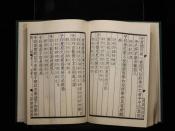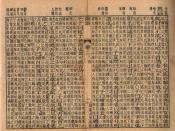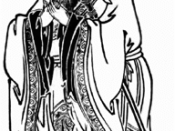The spiritual cornerstone of the oldest living and most populous civilization on Earth, The Analects by Confucius has inspired people all over the world with it's strong humanistic ideals. The book seems to be a record of various conversations between Confucius and his disciples and with the rulers of his time. These sayings, laconic and aphoristic, are difficult to interpret yet have shaped the culture of East Asia for thousands of years. Although The Analects are brief and often confusing, a clear picture is painted of Confucius's views on Propriety, Religion, and Politics.
In a modern world, Confucius's staunch belief in propriety can be difficult for one to understand to relate to than any other aspect of his teaching. In ancient times, however, society was fairly uncivilized. Without a certain code of conduct, the threat of barbarism becomes all the more real. Propriety offered a code of conduct that, although possibly outdated, had shown to work in the past.
These traditions also showed a society of gentlemen and cultured individuals that would be projected to the rest of the world. In the first book of The Analects, Yu Tzu offers an account for the value of propriety in a society. "Among the functions of propriety the most valuable is that it establishes harmony. The Way of the ancient kings from this harmony got its beauty. It is the guiding principle of all things great and small. If things go amiss, and he who knows the harmony tries to achieve it without regulating it by the rules of propriety, they will still go amiss."(1:12) Confucius himself warns of the dangers that can surface with the lack of propriety. He explains, "Courtesy not bounded by the rules of propriety becomes tiresome. Caution not bounded by the rules of propriety...


